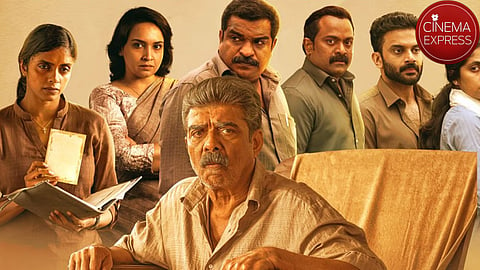A poignant study of unspoken regret
Ouseppinte Osiyathu(3 / 5)
Sarath Chandran RJ's debut feature Ouseppinte Osiyathu, scripted by Fazal Hassan, is a compelling drama that examines the fragility of familial bonds when faced with an unforeseen tragedy. Set against the picturesque yet brooding backdrop of Peermade, the film takes a measured approach to storytelling, prioritising emotional depth over plot-driven suspense. While it incorporates an element of crime, the heart of the film lies in its exploration of relationships—between a father and sons, between brothers and between spouses—unpacking how unspoken resentments and dependencies shape their fates.
Director: Sarath Chandran RJ
Cast: Vijayaraghavan, Dileesh Pothan, Kalabhavan Shajohn, Hemanth Menon, Lenaa, Zarin Shihab, Kani Kusruti, Anjali Krishna
The film opens with Michael (Dileesh Pothan) and George (Kalabhavan Shajohn) at a bank, grappling with financial troubles. Despite holding respectable positions—Michael as a Tehsildar and George as a senior police officer—both men remain financially tethered to their father, Ousep (Vijayaraghavan). Their younger brother, Roy (Hemanth Menon), is unemployed and passionately involved in social causes, much to the annoyance of his family. This first act of the film effectively establishes the strained yet inescapable dependence of the sons on Ousep. However, certain scenes feel slightly prolonged, and some trimming could have helped streamline the narrative. Vijayaraghavan's portrayal of Ousep is striking. A wealthy yet miserly patriarch who built his fortune through money lending, he maintains an iron grip over his sons' lives, dictating their choices with an air of authority that borders on tyranny. His interactions are laced with a biting sarcasm reminiscent of the actor's father NN Pillai’s iconic Anjooran in Godfather—a man good at heart but incapable of expressing his love openly.
The pivotal moment of the film arrives unexpectedly—an incident that transforms the narrative from a slow-burning family drama into an intense psychological study of guilt and moral dilemmas. The way this tragedy unfolds and the subsequent burden it places on Michael and George are executed with an understated yet devastating intensity. Dileesh Pothan delivers a powerhouse performance as Michael, particularly in moments where his bottled-up frustrations spill over. A poignant monologue sees Michael reflecting on his life after his mother’s passing, drawing a stark comparison between himself and the old jeep in their house. In their father’s eyes, he says, they were no different—both expected to function without question, to start at the turn of a key, to accelerate when commanded, and to follow the path dictated for them. Fazal's writing perfectly encapsulates the suffocating burden of duty, the exhaustion of silent obedience and the yearning to break free from the cycle of obligation. Kalabhavan Shajohn, playing the pragmatic yet equally troubled George, matches Pothan’s gravitas, making their dynamic the emotional core of the film.
Viewers accustomed to more plot-driven mysteries may find its deliberate unfolding slightly overbearing. The choice to present the central incident upfront, instead of building suspense around it, is a bold one, allowing the film to focus on the psychological repercussions rather than the event itself. Sarath’s direction, particularly his ability to weave in foreshadowing and moments of quiet devastation, is commendable for a debut feature. While the film briefly dips into police procedural territory, it never loses sight of its primary focus: the deteriorating relationships within the family. The strain extends to Michael’s marriage with Annie (Lena), who has long resented his submissiveness to his father. Though her character arc feels conventional and predictable, Lena delivers a solid performance, particularly in her confrontations with Michael. Similarly, Anjali (Zarin Shihab), Roy’s love interest, is relegated to a largely passive role. Kani Kusruti, in an extended cameo, is effective despite her limited screen time, portraying a soft-spoken yet sharp-minded police officer in the latter hour. Arvind Kannabiran’s cinematography is one of the film’s standout elements. It captures the lush yet isolating landscape of Peermade in a manner that enhances the narrative’s sombre tone. The misty hills and sprawling estates become an extension of the film’s themes, reflecting both the beauty and the oppressive weight of Ousep. Akshay Menon’s background score is equally effective, never overpowering the narrative yet subtly reinforcing its melancholic undertones.
Overall, Ouseppinte Osiyathu is less about the crime at its centre and more about the weight of unspoken guilt, the power dynamics within a fractured family and the suffocating nature of long-held grievances. It may not cater to those expecting high-stakes twists and turns, but for viewers willing to immerse themselves in its emotional intensity, the film offers a rewarding experience despite the missteps in the former hour.

